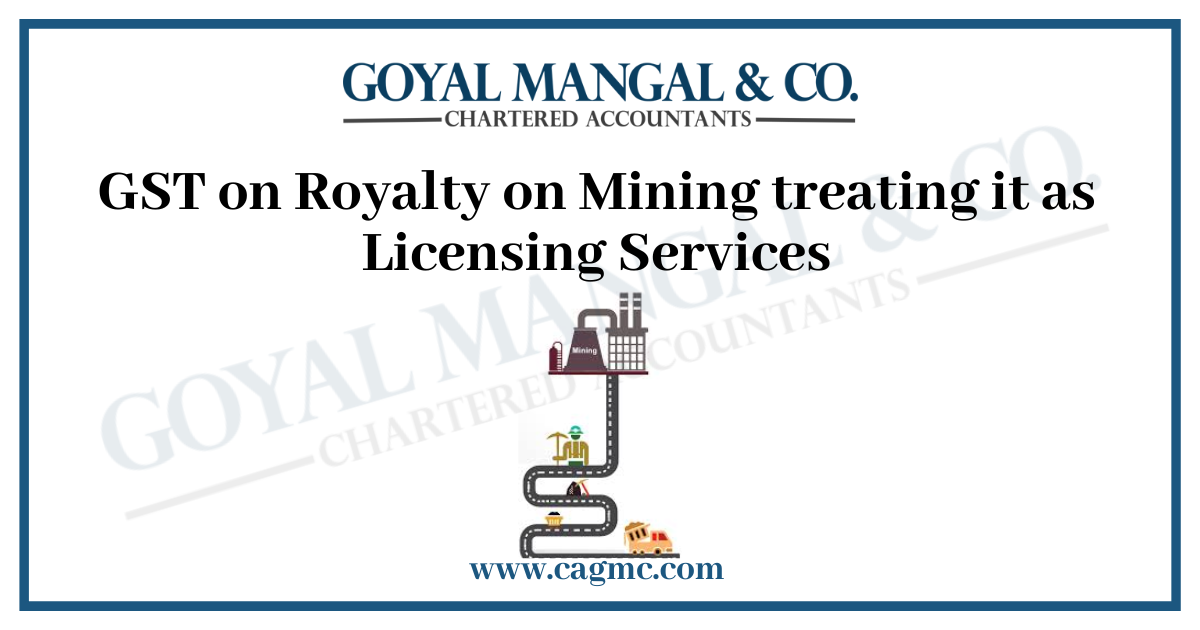
Goods and Services Tax (GST) is a comprehensive tax system that has been implemented in India since July 1, 2017. It has replaced the various indirect taxes like VAT, Excise duty, Service tax, etc. Royalty is a payment made by a company to another for using intellectual property such as patents, copyrights, trademarks, etc. In the case of mining, a royalty is paid to the owner of the land or the government for allowing the company to extract minerals from the land. Recently, there has been a debate on whether GST on royalty on mining can be treated as licensing services and if it is legal. This article will explore the position of GST on Royalty on Mining treating it as Licensing Services.
Background
Mining operations involve the extraction of minerals from the earth. These minerals are considered as natural resources and are owned by the state. Mining companies need to obtain a license from the government to extract these minerals. As a condition of obtaining a license, mining companies are required to pay a royalty to the government based on the value of minerals extracted. Let us now understand the basic meaning of Royalty and payable GST on Royalty, before we discuss the Legality of Treating Royalty on Mining as Licensing Services under GST.
What is Royalty?
Royalty under IPR refers to the payment made by one party to another for the use of the latter’s intellectual property. It is a type of compensation that a person pays to the owner of the intellectual property for the right to use it. In India, royalty is governed by various laws such as the Copyright Act, 1957, the Patents Act, 1970, and the Trademarks Act, 1999.
GST on Royalty
Under the Goods and Services Tax (GST) regime in India, royalties to businesses for the use of Intellectual Property Rights (IPR) are subject to GST. The term “royalties” has been defined in Section 9(3) of the CGST Act, 2017 to include payments made for the use or right to use any intellectual property.
Royalty payments are treated as supplies of services under GST, and the person making them is liable to pay GST on them. The GST rate applicable to royalty payments depends on the type of IPR used and the category of recipient. For example, if a license fee is paid for the use of a patent, trademark, or design, the applicable GST rate is 18%. However, if the recipient of the royalty payment is a registered person, they can claim input tax credit for the GST paid on those payments.
Royalty on Mining – Is it a Tax or a Fee?
Royalty is a payment made by the mining company to the government for the right to extract minerals from the earth. The question that arises is whether royalty is a tax or a fee. A tax is a compulsory payment made by a person to the government without any consideration in return. On the other hand, a fee is a payment made for a specific service rendered by the government. In the case of royalty, it can be argued that it is a fee since it is a payment made for the right to extract minerals, which is a service provided by the government.
Licensing Services under GST – What does it mean?
Under GST, licensing services are defined as the grant of the right to use intellectual property (IP) or similar products. The term ‘similar products’ includes the right to use industrial, commercial or scientific equipment. Licensing services are taxable under GST and attract a rate of 18%.
Royalty on Mining – Is it Licensing Services under GST?
The question that arises is whether royalty on mining can be treated as licensing services under GST. It can be argued that the right to extract minerals is similar to the right to use industrial or scientific equipment. Therefore, royalty on mining can be considered as licensing services under GST.
Legality of Treating Royalty on Mining as Licensing Services under GST
The legality of treating royalty on mining as licensing services under GST has been a subject of debate. The Central Board of Indirect Taxes and Customs (CBIC) have issued a circular stating that royalty on mining cannot be treated as licensing services under GST. The CBIC has argued that the right to extract minerals is not an IP right and is not similar to the right to use industrial or scientific equipment. Therefore, royalty on mining does not fall under the definition of licensing services under GST.
GST on Royalty on Mining treating it as Licensing Services
Royalty is a payment made by the mining company to the government for the right to extract minerals from a particular area. The government charges royalty as a percentage of the value of the mineral extracted or as a fixed amount per tonne. Royalty is a source of revenue for the government, and it is levied under the Mines and Minerals (Development and Regulation) Act, 1957.
- Position of GST on Royalty on Mining: The GST law provides that any supply of goods or services made for a consideration in the course of or furtherance of business is taxable under the GST regime. In the case of royalty on mining, the issue is whether it is to be treated as a supply of goods or services.
The government’s position is that royalty on mining is a consideration for the grant of a license to extract minerals, and therefore, it should be treated as a supply of services. The government argues that the mining company does not acquire any ownership rights over the minerals, but only a license to extract them, which is a service provided by the government.
- Treated as Licensing Services: In a recent ruling, the Gujarat Authority for Advance Rulings (AAR) has held that royalty on mining should be treated as licensing services under the GST regime. The AAR stated that the mining company does not acquire any ownership rights over the minerals but only a license to extract them. Therefore, the payment made by the mining company to the government is a consideration for the grant of a license to extract minerals, which is a service provided by the government.
- Implication of Treating as Licensing Services: If royalty on mining is treated as licensing services under the GST regime, then it will be taxable at the rate of 18%. This will have a significant impact on the mining industry, which is already facing various challenges such as environmental regulations, land acquisition issues, and social responsibilities. The mining industry may have to bear an additional tax burden, which may affect its profitability and competitiveness.
Whether Royalty paid should be treated as “Licensing Services” or a subject to GST?
The answer to this question lies in the interpretation of GST laws and regulations, let’s find out in greater detail:
- Under GST laws, “services” means anything other than goods, money, and securities. “Licensing Services” is defined as the granting of permission to use intellectual property rights such as patents, copyrights, and trademarks. However, there is no specific mention of royalty payments in the GST laws.
- In a recent ruling, the Authority for Advance Ruling (AAR) ruled that royalty payments made by mining companies to the government should be treated as “license services” and subject to GST. The AAR ruled that a mining company is granted the right to extract minerals from land by the government, which is a form of permit or license. Therefore, the royalty payments made by the mining company should be treated as consideration for the grant of the license and should be subject to GST.
- However, there are arguments against this judgement. Some experts argue that royalties are not for the granting of a license but rather for the right to extract minerals from the land. Payment is based on the value of the mined minerals, not the use of any intellectual property rights. Therefore, it should not be treated as licensed services and subject to GST.
- Another argument is that the government is not a “person” under the GST laws and cannot be treated as a service provider. Therefore, royalty payments made to the government should not be subject to GST.
Impact on Mining Industry
The mining industry is an important sector in India and contributes significantly to the country’s GDP. The imposition of GST on royalty on mining treating it as licensing services has a significant impact on the industry. Mining companies will now have to pay 18% GST on the royalty paid to the owner of the mineral rights. This will increase the cost of mining and reduce the profitability of mining companies. The industry has raised concerns about the impact of GST on royalty on mining on the competitiveness of the sector.
Conclusion
In conclusion, the treatment of royalty on mining as licensing services under GST is a contentious issue. While it can be argued that the right to extract minerals is similar to the right to use industrial or scientific equipment, the CBIC has taken the position that it does not fall under the definition of licensing services under GST. Therefore, it is advisable for mining companies to seek professional advice on the appropriate treatment of royalty on mining under GST.


